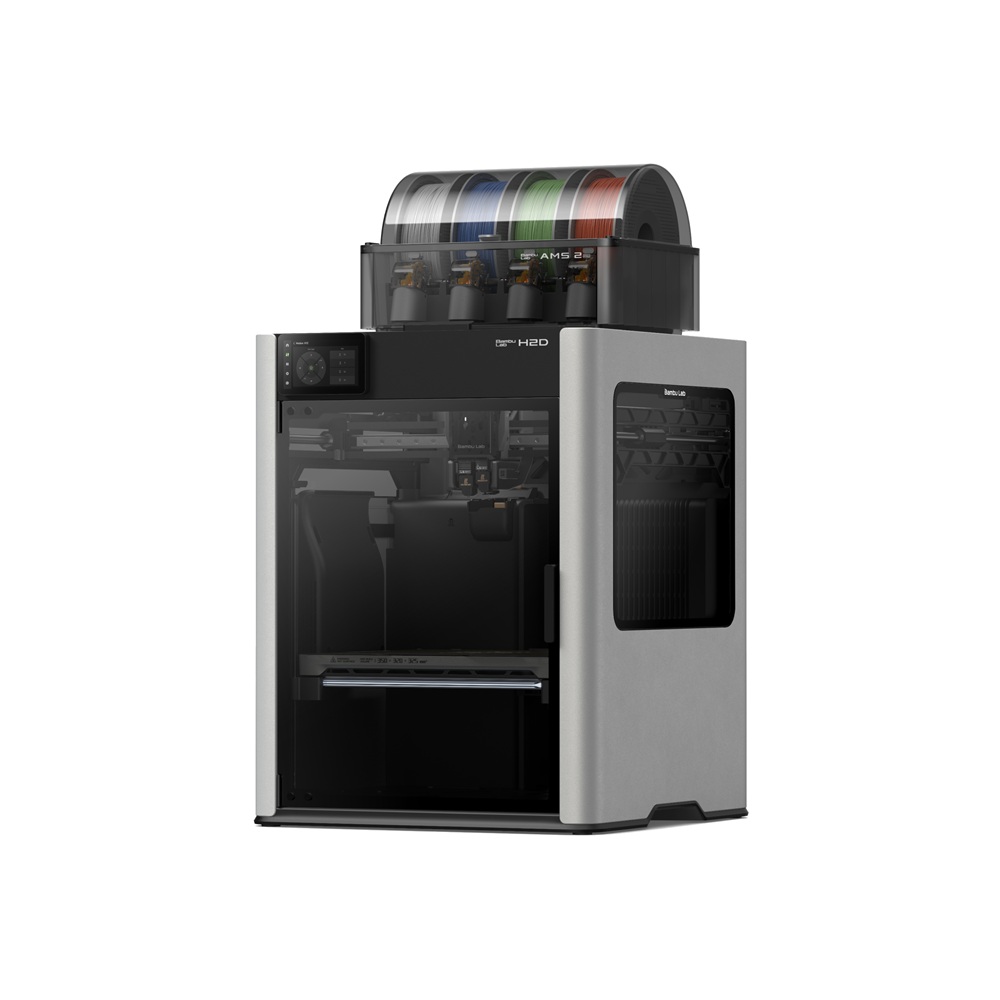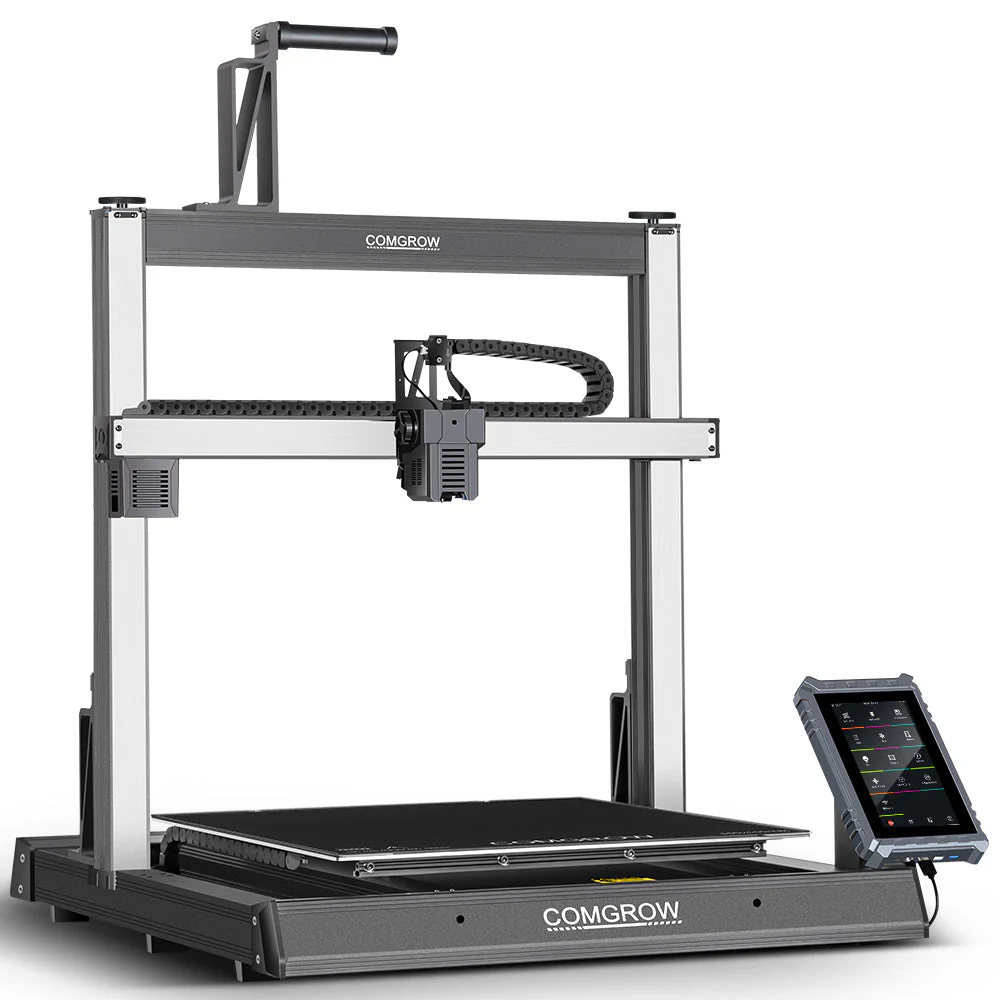Compare H2D vs Comgrow T500
Comparison between the best 3D printers
Choose the best 3D printer at the best price. The cheapest 3D printers are here.
Buy a 3D printer here with 3D Fila.
 |
 |
|
| Model | H2D |
Comgrow T500 |
| Printing Material | Filament | Filament |
| Buy Filament for Bambu Lab H2D | Buy Filament forSovol Comgrow T500 | |
| Estimated price | $1899,00 | $799,00 |
| Manufacturer | Bambu Lab | Sovol |
| Release Year | 2025 | 2024 |
| Print Volume [mm] | 350x320x325 | 500x500x500 |
| Printer Size [mm] | 492x514x626 | 817x810x962 |
| Weight [kg] | 42,3 | 39 |
| Power Loss Recovery | YES | YES |
| Enclosed printer | YES | NO |
| Bed Leveling | Automatic | Automatic |
| Filament End Sensor | YES | YES |
| Bed type | Heated | Heated |
| Power supply system | Direct Drive | Direct Drive |
| Standard nozzle | 0,4 | 0,4 |
| Maximum Nozzle Temperature [°C] | 350 | 300 |
| Maximum Bed Temperature [°C] | 120 | 80 |
| Maximum printing speed [mm/s] | 600 | 500 |
| Filament holder | YES | YES |
| Camera for supervision | YES | YES |
| Recommended filaments | PLA, PETG, ABS, ASA, TPU, PVA, Nylon (PA) | PLA, PETG, Fibra de Carbono, TPU |
| Recommended slicers | Bambu Studio | Creality Print, Cura 5.0 ou superior, Prusa Slicer, Orca |
| Maximum Resolution [mm] | 0,01 | 0,1 |
| Processor | ||
| Display | Touchscreen 5'' | 7'' IPS touchscreen, 60Hz |
| Power Supply | 500 W | |
| Connectivity | Wifi, Bambu bus, Cartão SD | |
| Operating systems | Windows, Mac, Linux | |
| Date of registration in the system | 2025-03-31 | 2024-07-18 |
| Release date | 2025 | 2024 |
| Extra features | Bambu Labs H2D combines high-speed 3D printing with a chamber heated up to 65 °C, dual extrusion with automatic nozzle switching, an AMS for filament drying and exchange, and AI sensors that detect failures. It offers optional laser and digital cutting capabilities, features intelligent calibration through computer vision, vibration control, enhanced fire safety, and real-time camera monitoring. | The Sovol Comgrow T500 stands out for its large print volume of 500x500x500 mm, ideal for large-scale projects. It has a direct extruder with a gear ratio of 6.5:1, speeds of up to 200 mm/s, and high-performance motors. The 7" touchscreen with Klipper software makes navigation easy. The 49-point automatic leveling ensures a perfect first layer. It also has a full metal hotend at 300°C, linear rails on all axes, and WiFi connectivity. |
| Support for multiple colors and materials (AMS and CFS) | YES | NO |
Notes * |
||
| Cost-benefit | 7 / 10 | 7 / 10 |
| Hardware | 7.2 / 10 | 3.2 / 10 |
| Tela | . | . |
| Print volume | 4 / 10 | 5 / 10 |
| Performance | 5 / 10 | 4 / 10 |
Conclusion |
| In concluding the comparison between the Bambu Lab H2D and the Sovol Comgrow T500, both models have their unique strengths that cater to different user needs and preferences. The Bambu Lab H2D represents a high-end option that excels in advanced features, such as a high maximum printing speed, dual extrusion capabilities, and enhanced intelligent technology for monitoring and error correction. Its enclosed design and higher maximum temperatures make it suitable for a broader range of filaments and more complex projects. However, the price point reflects its premium features, positioning it as an investment for serious hobbyists or professionals looking for top-tier performance. On the other hand, the Sovol Comgrow T500 appeals to those seeking a more budget-friendly solution without sacrificing a sizeable print volume. It offers significant value with its large build space, ease of use through its intuitive touchscreen interface, and efficient automatic leveling. While it may lack some advanced features and is not enclosed, it is still a solid choice for users focused on large-scale prints and practical design. In summary, the Bambu Lab H2D is ideal for users who require high performance and innovative functionalities, while the Sovol Comgrow T500 serves those needing practicality and affordability. Ultimately, the best choice depends on the user's specific requirements, budget constraints, and desired level of technology sophistication. |

